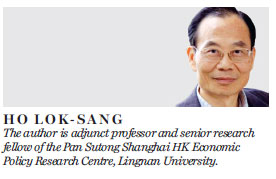HK radicals cannot determine what constitutes the rule of law
Updated: 2015-09-22 07:08
By Ho Lok-Sang(HK Edition)
|
|||||||
Professor Benny Tai Yiu-ting and his associates claim that the "Occupy Central" movement did not harm the rule of law and that on the contrary it strengthened the rule of law. As the anniversary of the "Occupy" movement approaches, it is a good time to re-examine what constitutes the rule of law.
Tai tried to explain: "The peaceful protesters asserted that their actions though illegal were based on the spirit of civil disobedience. The aim of the civil disobedience movement is to bring constitutional and political changes to the governance system making it more just. It is consistent with the rule of law because the ultimate purpose of the law under the rule of law should be achieving justice. Albeit paradoxical, breaking the law is to make the law better."
The classic case for civil disobedience was that of Rosa Louise McCauley Parks, who was honored in the US as "the first lady of civil rights" and "the mother of the freedom movement". On Dec 1, 1955, in Montgomery, Alabama, Parks refused to obey the bus driver's order to give up her seat in the colored section to a white passenger, after the white section was filled. The action, along with others, ultimately led to the end of segregation. Few would dispute that such acts of civil disobedience, which involved disobeying specific laws which were unjust, did make the law better.
But the "Occupy" campaign was an act of violating other people's rights, and disobeying good laws, in an attempt to overthrow what the occupiers claimed to be bad laws. During "Occupy", many ordinary Hong Kong people suffered because the occupiers violated a good law, which says obstruction of public roads is illegal. The occupiers wanted to hurt innocent people in order to achieve what they held to be a more just election system. Professor Francis Lui Ting-ming, who teaches economics at the Hong Kong University of Science and Technology, wrote that this behavior was akin to terrorism.
Tai and his associates initially spelled out in unambiguous terms a protocol for civil disobedience. According to the protocol, occupiers were to be rounded up by police peacefully and were supposed not to resist arrest. Hundreds of prospective occupiers signed the pledge to follow this protocol. At the time I expressed concern that even if Tai and those who signed up took the protocol seriously, others might not. As events unfolded, nearly all occupiers resisted arrest. The protocol was forgotten completely. Tai himself openly admitted the situation was out of his control.
More recently, there was the case of students storming into a University of Hong Kong (HKU) meeting room and occupying the venue where the HKU Council was discussing the appointment of a pro-vice-chancellor. Billy Fung Jing-en, president of the Hong Kong University Students' Union, said the action represented "using forces to restrain the unreasonableness of the institutions" and was justified. There were also incidents of "mobile occupy" or gouwu during which scores and sometimes hundreds of people disrupted busy streets, often forcing shops to temporarily close for business. These are examples of violating the legal rights of others in the name of furthering justice.
Tai says that when people offend the law they can be charged accordingly. Just like drivers charged with speeding, they should not affect the rule of law.
However, the rule of law is not just about law enforcement and the independence of the judiciary. When more and more people decide to disobey the law as they see fit, including good laws, the rights of other people going about their daily lives will be under threat. Earlier in the year, consultancy ECA International ranked Hong Kong 33rd in the world for livability, down 16 places from 2014. The agency attributed this decline mainly to the "Occupy" campaign.
The rule of law is held up by the judiciary, by people's general respect for the law and people's trust in the independence of the judiciary, and by a culture of respect for due process. Many occupiers deviated from the civil disobedience protocol that was supposed to govern their behavior. They have acquired a culture of disrespect for due process, even though they consider it a right to benefit from the system.
The HKU pro-vice-chancellor appointment issue shows that there is a lack of trust in council members. If many people do not get the results that they want, they will blame the system. But respect for due process means that people should accept whatever results arise from that process.
As more people acquire this culture of "the ends justify the means", the sense that one is protected by the rule of law is eroded. Tai can tell his students that the rule of law remains intact. The judiciary may still be independent. But both the judicial process and law enforcement get more costly, and get less effective in protecting the public. I will tell my students that this is the rule of law in decline, regardless of what Tai tells his students.

(HK Edition 09/22/2015 page8)